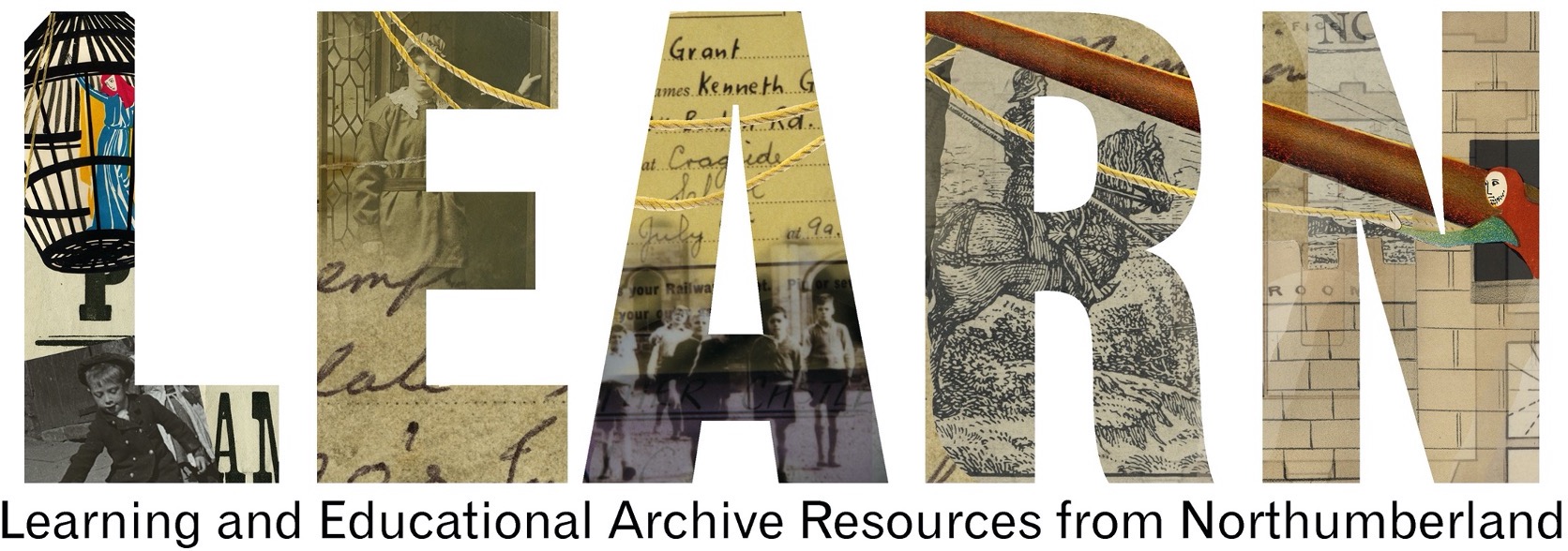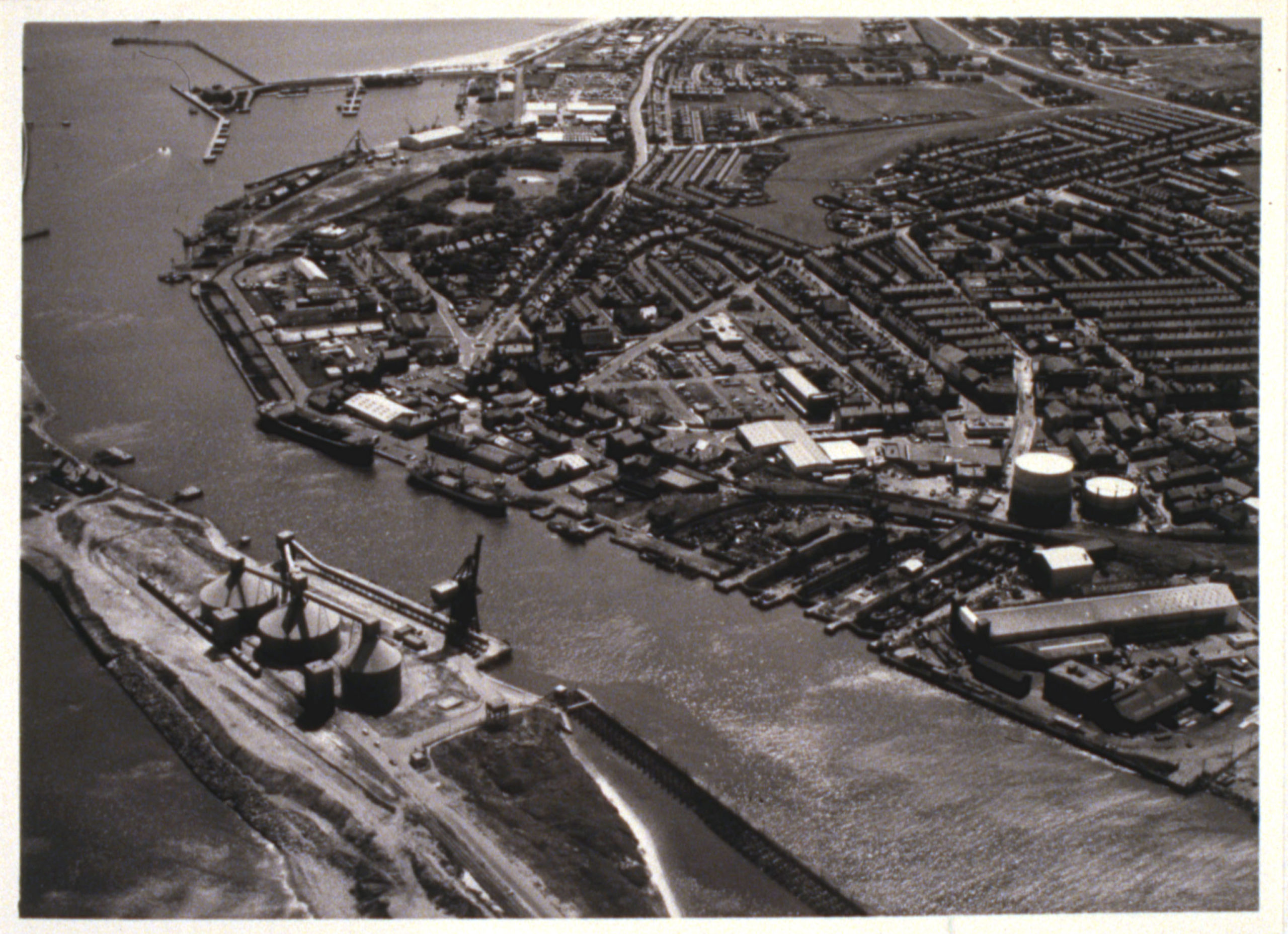Bombing of Blyth Oral Histories – John & Joan H, Recorded 2006
Reference: T/448, NRO 5525/07/11
Suggested age groups: KS1, KS2, KS3, KS4, Lifelong Learners
Subject areas: WW2, Air Raids, Bombing of Blyth
Download Word Document
Download PDF
The photograph of Blyth Harbour has been provided by Blyth Harbour Commission.
John and Joan H – T/448 – Part 1
John and Joan H – T/448 – Part 2
John and Joan H – T/448 – Part 3
CONTEXT
These sound files are extracts (short edited pieces) from longer oral history interviews preserved by Northumberland Archives. These interviews were made as part of a project to collect the memories of people who lived on the Northumberland coast.
For each person there is a short extract where they introduce themselves and other extracts where they talk about their experience of the bombing of Blyth during the Second World War.
John and Joan are a married couple from Blyth. They were born during the 1930s.
John and Joan describe the beach defences in Blyth, including concrete block defences on the beach, barbed wire to block access to the beach, gun turrets and Nissen huts in the farmers’ fields. They mention the Submarine base at Blyth being one of the main submarine bases, where John’s father worked. They mention Blyth’s ship building industry. Joan tells the story of her uncle, who worked at the pit, being blown out of bed into his garden when a mine was dropped onto the golf course behind his house on Plessey Road. The mine was aimed to land on the nearby railway line but missed. Joan describes see the aftermath of the bombing and having to climb over mounds of clay to get to school. Joan describes children playing in the shelters at the grammar school, which stayed in place for a time after the war.
John describes being at the cinema during a German attack using incendiary bombs. He described running from the Wallaw Cinema on Union Street to his home on Park Road under attack and seeing tracer bullets from a German aeroplane. John says that he was not frightened at the time, he was just thinking about running home, there was a shelter in the back lane. Joan describes the Anderson shelter in her garden and remembers growing vegetables around it. She talks about feeling scared as soon as the siren went off and that her family slept in everything but “top clothes” so that they would be ready to go to the shelter during the night. The shelter had a stove, bunks, and a kerosene lamp. Joan’s uncle, who worked at the shipyard, was an air raid warden, and her father was in the Home Guard.
ACTIVITIES
ACTIVITY 1
Background
John and Joan are a married couple from Blyth. They were born during the 1930s.
John describes being at the cinema during a German attack using incendiary bombs. He described running from the Wallaw Cinema on Union Street to his home on Park Road under attack and seeing tracer bullets from a German aeroplane.
Joan tells the story of her uncle, who worked at the pit, being blown out of bed into his garden when a mine was dropped onto the golf course behind his house on Plessey Road. The mine was aimed to land on the nearby railway line but missed. Joan describes see the aftermath of the bombing and having to climb over mounds of clay to get to school.
SEE
See: Who are John and Joan?
See: When were John and Joan born?
See: Where did John grow up in Blyth?
See: Where did Joan grow up in Blyth?
THINK
Think: What impression do you have of John and Joan’s families? Why?
Think: Why do you think John wasn’t scared when running home from the cinema?
Think: How do you think John’s mother might have felt when they were running home from the cinema?
Think: How do you think the bomb landing on the golf course impacted Joan?
Think: Why do you think John and Joan reacted so differently to the two different attacks?
DO
Do: Create a map to showing John’s route from the Wallaw Cinema on Union Street to his home on Park Lane.
Do: Write a monologue from the perspective of John’s mother about the experience. Think about how John and his mother may have had different feelings about it.
Do: Write a monologue from John’s perspective about the experience. Think about how John and his mother may have had different feelings about it.
Do: Write a diary entry from Joan’s perspective about the aftermath of the golf course bombing.
Do: Create a drawing interpreting the scene that Joan may have seen on her walk to school the morning following the golf course bombing.
Do: In groups, debate how effective air raid measures were for protecting British people during WW2.
Do: Imagine you are in charge of air raid safety in your town. Write a set of procedures telling people what to do in the event of an air raid.
Resources
ACTIVITY 2
Background
John describes being at the cinema during a German attack using incendiary bombs. He described running from the Wallaw Cinema on Union Street to his home on Park Road under attack and seeing tracer bullets from a German aeroplane. There was a shelter in John’s back lane.
Joan tells the story of her uncle, who worked at the pit, being blown out of bed into his garden when a mine was dropped onto the golf course behind his house on Plessey Road. The mine was aimed to land on the nearby railway line but missed. Joan describes see the aftermath of the bombing and having to climb over mounds of clay to get to school. Joan describes the Anderson shelter in her garden and remembers growing vegetables around it.
John and Joan describe the beach defences in Blyth, including concrete block defences on the beach, barbed wire to block access to the beach, gun turrets and Nissen huts in the farmers’ fields.
SEE
See: Which areas do John and Joan mention being attacked in Blyth?
See: What types of bombs and attacks are mentioned?
See: What types of bomb shelters are mentioned?
See: What types of bomb damage are mentioned?
See: What types of bomb defences are mentioned?
See: What wartime positions does Joan mention that her uncle and father had?
THINK
Think: Why do you think Blyth was bombed during the war? What features do John and Joan mention that may have led the town to be targeted?
Think: What was the purpose of air raid shelters?
Think: Who had access to air riad shelters?
Think: Why did different people have different types of air raid shelter?
Think: How effective were air raid shelters?
Think: What was the purpose of an air raid warden?
DO
Do: Look at the data gathered by the War, State and Society Bombing Britain website, can you sort the data so that you can only see the bombings that took place in the North of England?
Do: Using the data from Bombing Britain, create a map showing the places that were bombed in the North of England.
Do: Using the data from Bombing Britain, create a table showing the bombings that took place in the Blyth area.
Do: Using the data from Bombing Britain, create a table showing the number of casualties that occurred as a result of bombings in Blyth.
Do: Using a map of Blyth, plot different defences in strategic locations to protect the town from attack.
Do: Research the different types of air raid shelters and create a poster showing their different features and how effective they were to protect their users from attacks.
Do: Create a model of Joan’s Anderson shelter.
Resources
ACTIVITY 3
Background
These sound files are extracts (short edited pieces) from longer oral history interviews preserved by Northumberland Archives. These interviews were made as part of a project to collect the memories of people who lived on the Northumberland coast.
For each person there is a short extract where they introduce themselves and other extracts where they talk about their experience of the bombing of Blyth during the Second World War.
SEE
See: Why were these oral histories recorded?
See: Who took part in these oral history interviews?
See: What is included in the oral history extracts?
THINK
Think: What is an oral history?
Think: Why is it important to record oral histories?
Think: What is the value of oral histories?
Think: Who might use oral histories?
Think: How reliable are oral histories?
Think: What types of oral histories might be recorded?
DO
Do: Imagine you are about to interview a someone who experienced the bombing of Blyth for an oral history. Write down a list of questions or talking points that you might use to prompt them during the interview.
Do: Write down a list of events that have taken place during your lifetime that you think it would be important to create oral history records of.
Do: Write down a list of events that have taken place before your lifetime that you think it would be important to have oral history records of.
Do: Look at the British Library, British Library Sounds and Imperial War Museum websites. Can you find oral history recordings about the events from your lists?
Do: In pairs, think of an event that you have both experienced first-hand. Interview each other about your chosen events and create oral history recordings. Listen back to the recordings, do both of your memories of the event match? Why might people have different memories of the same event?
Do: Imagine you are either John or Joan, choose one part of their oral history interview and write a diary entry from their perspective of one of the events they describe.
Resources
OTHER ONLINE RESOURCES
BBC Peoples War website, page with memories of Blyth: https://www.bbc.co.uk/history/ww2peopleswar/stories/00/a6825800.shtml
Port of Blyth website, page about the history of the port: http://portofblyth.co.uk/history/
Air Raids
Imperial War Museum website, page about air raid preparation: https://www.iwm.org.uk/history/how-britain-prepared-for-air-raids-in-the-second-world-war
Imperial War Museum, page about what to do in an air raid: https://www.iwm.org.uk/history/what-to-do-during-an-air-raid
Imperial War Museum website, page with example of a “siren suit”: https://www.iwm.org.uk/collections/item/object/30097186
War, State and Society website, page with Bombing Britain database: http://www.warstateandsociety.com/Bombing-Britain
Air Raid Shelters
The Guardian newspaper website, page about Anderson Shelters today (includes photos of them): https://www.theguardian.com/world/2018/aug/21/how-britains-abandoned-anderson-shelters-are-being-brought-back-to-life
Anderson Shelters website (lots of information and some personal stories): https://www.andersonshelters.org.uk/
Spartacus Educational website, page about Anderson Shelters (includes primary sources): https://spartacus-educational.com/2WWandersonshelter.htm
RAF Museum website, page about different types of air raid shelters: https://www.rafmuseum.org.uk/research/online-exhibitions/history-of-the-battle-of-britain/air-raid-shelter-protection.aspx
Blyth Submarine Base
Imperial War Museum website, page with photo of HMS Elphin, a training base for submariners at Blyth: https://www.iwm.org.uk/collections/item/object/205185774
Mirror newspaper website, page about submarine sunk during WW2: https://www.mirror.co.uk/news/uk-news/found-77-years-on-icy-11462684
Blyth Beach Defences
Blyth Battery https://www.blythbattery.org.uk/
Simpson and Brown architects website, page about restoration of Blyth Battery: https://www.simpsonandbrown.co.uk/architecture/ruins-monuments/blyth-battery/
Historic England website, page about Blyth Battery: https://historicengland.org.uk/listing/the-list/list-entry/1021401
Wallaw Cinema, Blyth
Cinema Treasures website, page for Wallaw Cinema: http://cinematreasures.org/theaters/1826
Historic England website, page about Wallaw Cinema: https://historicengland.org.uk/listing/the-list/list-entry/1031569
Oral History
Website for Oral History Society, includes definition of oral history: https://www.ohs.org.uk/
University of Leicester information sheet on oral history (pdf). Although the language isn’t the most accessible it does discuss value and reliability of oral histories: https://www.le.ac.uk/ur/emoha/training/no1.pdf
Website for Glasgow Women’s Library, blog discussing oral history project, includes definition: https://womenslibrary.org.uk/2017/08/09/what-are-oral-histories-and-why-are-they-important/
British Library website, page for oral history collections: https://www.bl.uk/collection-guides/oral-history
British Library Sounds website, includes oral history recordings: https://sounds.bl.uk/Oral-history
Imperial War Museum website page for oral history collections, one of the biggest oral history collections in the country. Many can be searched and listened to online: https://www.iwm.org.uk/collections/sound


